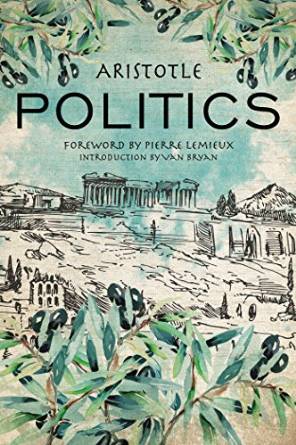Are there warring factions in any political society? We wonder.
Is that where all our problems stem from?
The idea that the few, wealthy oligarchs are constantly at odds with the disadvantaged masses is nothing new. In fact, if we were to read Aristotle’s The Politics, we might see that it’s been going on for millennia.
|
It’s worth noting that the Aristotle, like all of us, was a product of his time. His understanding of a political society, as a result, is slightly skewed from our own.
For starters, there were not countries as we understand them today. Rather there were insulated city-states (polis) that acted as autonomous nations, independent of any larger governing body.

The Politics, by Aristotle
Classical Wisdom Weekly edition
Additionally, Aristotle constructed his idea on political justice with the assumption that there were those in a society who were, inherently, unequal (women and slaves).
For these reasons we must approach The Politics cautiously, humbly. Not all of Aristotle’s ideas will gel with our own modern sensibilities, but there is enough meat there that we would be foolish to abandon our pursuits all together.
So, where were we?
Aristotle portrayed the never-ending battle between the haves and have-nots in terms of oligarchs vs. democrats (those who would benefit from a direct democracy).
You can imagine the oligarchs and democrats in terms of classical society, farmers and laborers vs. well-educated aristocrats. However, we could just as easily recast this fight in the 21st century. Picture young lefties fresh out of their liberal arts college picketing outside some prestigious Wall Street hedge fund where the traders wear Brooks Brothers suits and winter in the Hamptons.
Like I’ve said before, history can sometimes be so unoriginal.
All disagreements stem from inequality…
The combatants, Aristotle says, disagree on the true meaning of justice. All political conflict, he writes, springs from competing definitions of equality and all the bickering that follows is essentially a philosophical disagreement that plays out in the forms of campaign promises and, in the words of our CEO, “political claptrap”.
|
The disadvantaged masses believe justice to be numerical equality. The oligarchs see equality in terms of proportions; those who contribute more deserve to have more.
The consequence of such an altercation is that each party will vie for political control. The masses, should they achieve success, will be
“You can imagine the oligarchs and democrats in terms of classical society, farmers and laborers vs. well-educated aristocrats. However, we could just as easily recast this fight in the 21st century. “
swept in to office and proceed with a massive redistribution of wealth. The oligarchs, should they have control, will tighten the purse strings; make sure they hold on to as much as they can.
Aristotle, to his credit, does not seem to have a dog in this fight. He does his part as a, mostly, impartial observer. He comes to the conclusion that both sides have their merits.
But here’s the kicker- they’re both wrong.
What’s good for me is good for you… well, at least it’s good for me.
The problem stems from the confusion that what appears just to us, represents, unequivocally, true Justice. What seems good to us must therefore be Good.
What’s good for me is good for you, and even if it’s not good for you, at least it’s good for me.
Redistributing wealth might seem like justice to the poor, but this leads to conflict between the citizens. True justice, since it is a virtue, would never lead to such strife. The only justification then seems to be that such actions appeared to be just to those in power.

Aristotle, author of The Politics
But let’s be clear, Aristotle isn’t painting the oligarchs as the poor rich kid on the playground who is bullied because his parents can afford expensive cars and designer shoes.
Should the oligarchs hold control, Aristotle says, they will “confiscate and plunder the possession of the masses.” The justification, again, is that this appears just to those in power.
When you get right down to it, Artie seems to be saying that both parties are aiming in the right direction, but neither one have hit the mark.
The fight for the soul of political justice
In order to really grasp why any of this matters, we must first understand what Aristotle believed to be the goal and ultimate end of a political society.
The Aristotelian state was the vehicle through which a citizen would achieve a self-sufficient
“When you get right down to it, Artie seems to be saying that both parties are aiming in the right direction, but neither one have hit the mark.”
life that was “happy and fine”. The currency in such a state was justice, true justice, which would lead to the larger goal- a happy and virtuous life for the citizens.
The conflict between the oligarchs and the democrats, therefore, is significant because they are both fighting for the soul of political justice, an integral part of achieving the ultimate function of the political state.
|
So the battle rages on, each party pursuing their own idea of justice while never really coming across true justice.
You may be wondering, what’s a philosopher to do? Pick a side and batten down the hatches? Abandon all hope and go along with the claptrap?
Maybe…
Maybe not…










No comments
Trackbacks
Our apologies, you must be logged in to post a comment.